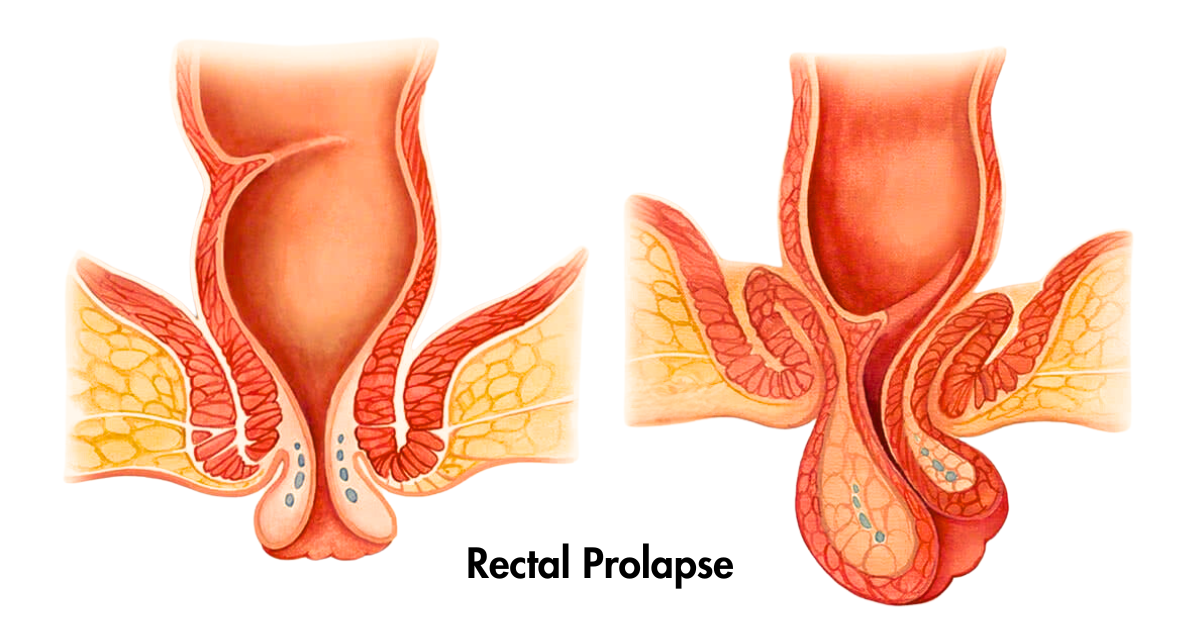People of all ages, both sexes, can get rectal prolapse. This may occur when the rectum-supporting muscles and tissues become weak, which can happen with age or after pelvic surgery. Diarrhoea, prolonged constipation, and straining while defecating are further risks. When it comes to rectal prolapse, there are a number of viable therapy choices. Patients can enhance their quality of life and decrease the risk of problems related to this disorder with effective diagnosis and care.
What Happens During a Rectal Prolapse?
The anus is occluded and the rectum sticks out in this state. This occurs when the rectum slips out of its usual position due to a weakening of the tissues and muscles that support it.
What are the causes of Rectal prolapse?
There are several different things that can cause rectal prolapse. Among the most prevalent reasons are:
- Loss of strength in the pelvic muscles, which may occur with age
- Giving birth
- Regular bowel movements
- Nerve damage
- Prolonged diarrhoea
- Previous pelvic surgery
What are the symptoms of Rectal Prolapse?
Symptoms can vary from mild pain to severe agony and even bleeding, depending on whether the prolapse is partial or total.
Possible further symptoms are:
- Discomfort.
- Pain.
- Discharge of blood.
- Problems with defecation.
Diagnosis of Rectal Prolapse
The most noticeable sign of rectal prolapse is when the rectum pushes out of the anus. There are two types of prolapse: partial and total. Both the patient’s medical history and the results of a physical examination are used to diagnose rectal prolapse.
- The doctor may do a digital rectal exam to look for problems with the rectum and anus.
- Different evaluations: To further confirm the diagnosis and assess the severity of the prolapse, a diagnostic procedure like a colonoscopy, sigmoidoscopy, or anoscopy may be carried out.
- The rectum and colon can be seen using a camera during these examinations.
- To further investigate potential reasons for rectal prolapse, such as nerve injury or weak muscles, further imaging studies such as MRI or CT scans may be suggested.
In order to avoid problems such as tissue damage, infections, and faecal incontinence, it is crucial to consult a medical professional as soon as possible after experiencing symptoms of rectal prolapse.
What are the Treatments available for Rectal Prolapse?
Rectal prolapse treatment methods range from non-invasive to invasive surgical procedures. How serious the prolapse is determines the course of action.
Non-invasive alternatives
- Stool softeners, dietary adjustments, and pelvic floor exercises are non-surgical alternatives that may be considered in mild instances.
- To avoid a recurrence of rectal prolapse, it is essential for patients to make modifications to their lifestyle, such as keeping to a healthy weight and not putting undue strain on themselves when they urinate or carry heavy objects.
- In order to keep tabs on their health and deal with any issues that may arise, patients should schedule follow-up appointments with their doctors on a frequent basis.
You can also read: Rectal Cancer: Signs, & Treatment
Procedures involving surgical instruments
- Surgical procedures like rectopexy or a perineal approach may be necessary for moderate-to-severe instances.
- The minimally invasive nature and faster recovery times of laparoscopic surgery have contributed to its rising popularity in recent years. Having said that, not every patient will be a good fit for this procedure.
Urgent medical intervention is required for patients with rectal prolapse in order to establish the best treatment plan suited to their individual needs.
Conclusion
Rectal prolapse treatment can improve a patient’s quality of life. In the event that you or a loved one needs urgent medical assistance due to an injury, illness, or other medical emergency, you can also contact Dr. Avadh Patel, a top colorectal surgeon in Ahmedabad.

